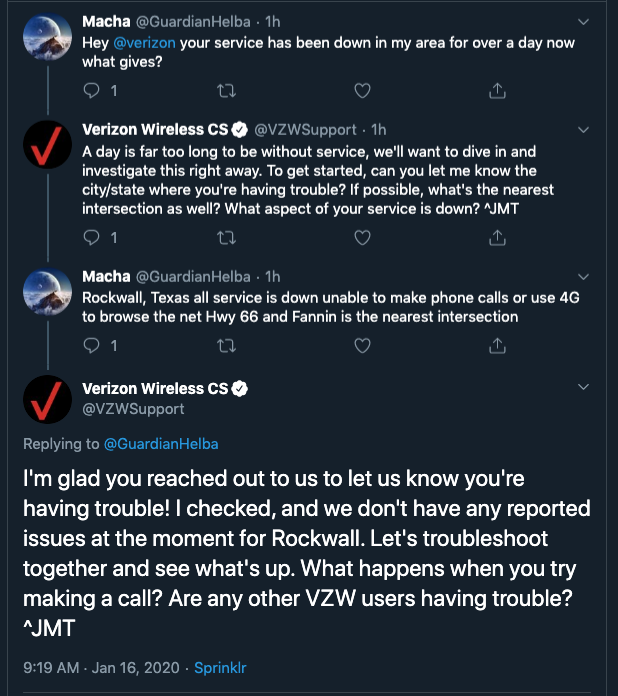Managing Your Brand’s Reputation
- Learn how to monitor social feeds, check reviews and respond to feedback.
- Discover the importance of an online reputation and why it matters.
- Learn what’s involved in the process and how to make the process easier.
Humor us for a moment: do a quick Google search on your brand. Review the first couple of pages of results: Did you find anything that surprised you? Who else is talking about your brand? What are they saying?
You need proactive planning, quick response, and ongoing strategy to protect your brand from the persuasive effects of negative online content. So, let’s talk details. How does that look in practice?
How do you manage your brand’s online reputation?
- Always be as honest and transparent as possible.
- Actively monitor your brand’s social mentions and direct messages.
- Be aware of what people are saying about you on websites like Yelp.
- Address positive and negative feedback in a timely and polite manner.
- Be ready to tackle difficult PR situations at any time.
Start With the Basics
PR company, Massive, describes reputation management as “the control of how a person, brand or activity is perceived by stakeholders, customers, employees or the general public.”
But how do brands monitor their reputations online?
- Monitoring social feeds
You need to be checking your feeds for posts on your page and mentions of your company on the internet. You need to be checking what shows up when you Google your brand name. 90% of people worldwide form their opinion about a brand based solely on the first page of a Google search. Diligently monitoring your social and online presence is imperative for managing your brand’s reputation. You can’t put out a fire you can’t see. - Checking reviews
93% of people say that the reviews they read online about a company or product will impact whether or not they make a purchase. That’s a lot! That means you need to be checking reviews on your website, social media, and through third-party websites like Yelp. - Responding to feedback
The comment sections of the online world are where consumers can interact one-on-one with each other in a public forum. Direct messaging is useful for in-depth conversations about specific issues, however, the conversation will likely start under the public eye. Sometimes the comment is on a post you have created; other times it is in response to someone else’s mention of your organization. It’s important to mend the situation, but to also ensure your brand is seen mending the situation. While private DMs are effective in communicating with one specific customer, they don’t show the rest of the world that you offer help when needed. Make sure to respond both publicly and privately (if needed).

Why is online reputation management important?
If you mismanage your online reputation by ignoring what is out there about you or your company, a vicious cycle is where you’ll find yourself. It’s a scary place full of rumors and misinformation. By ignoring your problems, you’re relinquishing all control to the masses. Mob mentality is sure to set in.
However, if you choose to take care of your online presence, the virtuous cycle is where you’ll be. Your presence online will be more positive than negative and will reflect you or your brand more accurately. This is where you want to be. And we’re here to help you get there.
You don’t have to be a large business to worry about your online reputation. Small, local businesses such as law firms, nail salons, and dental practices have to be aware of their online reputation, too. Local businesses interact with a smaller group of people who might not only be Facebook friends but real-life neighbors. It’s important to manage what people are saying about your brand online no matter how big your business is. For a large company, one negative review could easily be drowned out by a hundred positive ones. If you’re a small business, that one comment will hold a lot more weight because there is a smaller volume of reviews to support your reputation.
Knowing how to manage your online reputation gives you the opportunity to have a say in what people say about you. Perception is reality. If people perform an online search of your company and the first thing they see are hate sites, negative reviews, or negative media sites, their perception of your company will be abysmal.
Algorithms promote links that receive more traffic. Usually, attention-grabbing or shocking headlines serve as clickbait. So, if they see the headline “Verizon Urged to Reinstate Suspended Worker Who Saved Cat“, the fire has started because news sites know a headline that tugs on heartstrings will be clicked on and engaged heavily with. The article title alone evokes emotion and forms an opinion in your head about the brand; you don’t even have to read the article for these things to happen. Cat lovers of the world will be up in arms over Verizon’s seemingly heartless decision. ORM will help you figure out how to respond to situations in the right way to preserve most of your brand’s positive reputation and business. It’s all about prioritizing balance in a world where online reputations are becoming almost more pervasive than the in-person ones.
If you’re a business or brand looking for new customers or clients, your online reputation should definitely be important to you. Your social media presence or the Google results that come up with your company name could mean earning or losing a new customer.
Oh, and not like you haven’t heard this enough, but the internet is forever. Your online reputation is your permanent reputation unless you continually work to manage it as problems arise.
What’s Involved in the Process?
If you’re familiar with SEO, ORM has some similarities. SEO, or Search Engine Optimization, is about setting up your online presence in a way that search engines like Google and Yahoo can understand and easily navigate. Basically, “good” SEO means that you are getting a lot of traffic to your website or blog because people are easily finding it through related search engine results.
ORM requires a bit more. It’s less about tricking the algorithms and more about making them work for you. As we’ve already discussed, perception is reality, and you want people to see the best parts of you. This process is going to involve things like vigilantly monitoring your social media. One rule to live by: don’t let things get away from you! You want to know what people are saying about your brand or else you have no way to speak up for your brand when you’re criticized.
1 in 5 businesses say that they’re unhappy with the way their organization is represented on the first page of a Google search. Not a great statistic. We want to help you be a part of the four, not the one. If the process of ORM seems daunting to you, we’re pros at creating comprehensive social content, social feed monitoring, website and Google review management, and more. We don’t only help you monitor negative reviews, we can help you increase the number of positive reviews you (and your potential customers) see.
In very serious situations, you may need to figure out if the slander you’re seeing is illegal (because sometimes it is). In the United States, consumers have a right to freedom of expression; however, if the material is false or specifically targeting the reputation of your company, you may have the legal right to remove it. In Australia, where free speech rights are a bit different than in the U.S., hateful or racist comments online can be brought to court and convicted of a crime. In the States, there have been convicted cases of perpetrators who posted threatening comments online. However, there is a fine line between determining a “true threat” and an aggressive remark.
Contacting a legal liaison, removing or hiding a review from your site, or conducting an online investigation with your legal representation and the third party website are all ways you can mitigate potential slander. This process is never quick or fun, but can be necessary to protect the future of your brand.
How Can I Make It Easier?
You’ve got to learn to make good, quick decisions when it comes to managing your online reputation. You have to ask yourself if a bad review requires a reaction or response. If so, how do you do it?
The worst response to a PR crisis is no response. Ignoring the problem doesn’t make it go away. Usually, it makes it grow bigger. So, it is our professional recommendation to NOT not respond. Doing anything is better than doing nothing.
One possible way to combat comments like the ones above? Prioritizing a platform of transparency. Offer honesty instead of disguised truth. Just be warned: this does come with risk. You open yourself up to a lot of public critique when you lead with honesty. However, if you hide vital information from the public and it gets out, you could be digging your brand’s grave.
A proactive way to manage your online reputation is to regularly publish content for your business, blog, or e-commerce. This way you will have a present profile that is mostly your own. If people see a negative review, they will be able to easily see what you have to say for yourself without much looking.
And most of all, be prompt! Respond or remove quickly. This can only be done if you’re monitoring your social feeds closely.
Or, you know, there’s always humor. Nothing unites a group of warring tweeters like a well-timed joke. Wendy’s knows how to do this well:

Conclusion
So, are you convinced that your online reputation matters for your business? We hope so, because it really is vital to the success of your brand in today’s digital age.
Not sure how to start managing this all for yourself? Let Ardent help you level up your online reputation management game. Contact Ardent
